- Home
- Jennifer Ashley
The Alexandria Affair Page 4
The Alexandria Affair Read online
Page 4
James Denis
That was all. I turned the paper over but there were no further instructions, no hints about a place to start.
“Is he mad?” I said out loud. “What the devil does he think I can do?”
Footsteps sounded on the landing before the door of my bedchamber swung open. Grenville stood on the doorstep in a velvet dressing gown, a candlestick in his hand.
“What is it, Lacey? I heard you cry out.”
I thrust the paper at him from where I sat in my bed. “Mr. Denis instructs me to hunt for a needle in a haystack, when both needle and haystack might no longer exist. He is having a joke on me.”
Grenville’s dark eyes glittered as he quickly read the letter. “Ah, the lost book of Aristarchus. I have heard of it.” He handed the paper back to me. “If you find it, ’twill indeed be a magnificent discovery. And very valuable.”
“Why should he suppose I can find it?” I asked in irritation. “A Spartan soldier, information from the sixteen hundreds, one of Napoleon’s savants—he is laughing at me.” I tossed the paper to my coverlet.
Grenville regarded me thoughtfully. “I believe he concludes that if anyone can find this lost treatise, it will be you. A high compliment to your abilities.”
I gave him an irritated look. “So I am to run through Alexandria, perhaps up and down the Nile, asking if any of the men digging for the past have stumbled across a lost treatise on astronomy? I will be a laughingstock.”
“Actually, the story has been told in literary circles since Napoleon fled Egypt,” Grenville said, far too calmly. “Others have searched for the book—I imagine we’ll find men here who have made the attempt. Some might be generous and share their insights. There are gentlemen who are obsessed with finding such treasures, and funnily enough, they are often successful. They carry on when the rest of us fall by the wayside.”
“You can certainly believe Mr. Denis has an obsession,” I said sourly. “For me running impossible errands for him.”
“I believe Mr. Denis cares only for the value of the book, both historic and otherwise,” Grenville pointed out. “He knows you have a nose for puzzles, and that I share your interest. He has sent this task to two gentlemen who have far more curiosity than is good for them.”
I had to agree that Denis read us well. “I should toss his letter onto the fire and refuse.”
“We’d have to start a blaze for that, and it’s a bit warm,” Grenville said. “Fortunately a large part of the task will involve something at which I excel—talking to people.”
I glanced at him in surprise. “You would help me look for it?”
“I admit, I am intrigued. I’d like to hear what the local men have to say about it. The fellahin, I mean, who know amazing tales. Haluk is a fine enough gentleman, but he’s a Turk through and through—I wager he does not know much about the country he lives in, barring his readings about ancient Alexandria. He did not say so, but I imagine the poor fellow is in exile.”
I had come to the same conclusion. He’d spoken of his house in Smyrna far too longingly.
“There are worse places to be exiled,” I said.
“True,” Grenville conceded. “But home is the sweetest place of all. Good night, Lacey.”
Grenville shut the door, and I lifted the letter again.
Damn and blast Denis. I hated that he read me so accurately that he knew a foolish quest for legends and lost treasure would suit me. He also knew that I’d consider a book from the famous library in Alexandria worth finding—I’d not be disappointed he wasn’t searching for gold.
I put out my candle but my exhaustion had fled. I lay awake picturing myself triumphantly laying my hands on this ancient papyrus and the satisfaction that would bring. Whether or not I’d hand it over to Denis was a different matter entirely.
* * *
I woke to sunlight streaming through my shutters and a high-pitched, wailing voice singing words I did not understand. I scrambled out of bed, my feet landing on the dusty floor, and made my way to the window.
Below in the courtyard, the Mohammedans among our servants had laid out carpets and were now kneeling upon them and bowing low with such gracefulness that I could only watch in admiration. The goats that shared the courtyard with us milled about the praying men, seemingly unbothered.
I made note of the sight in my travel journal for Gabriella and also wrote of our curious little house here, filled with people but no furniture.
Bartholomew interrupted me to bring breakfast on a tray. We’d arrived in Egypt shortly after the month of Ramadan—of fasting—ended, Grenville had told me, so we needn’t worry. There would be food aplenty.
“Not what we’re used to,” Bartholomew said apologetically, setting the tray on my bunk. “They don’t much understand an Englishman’s breakfast, these servants. And in the middle of preparing it, there’s a man yelling, and they rush away to start bobbing on their carpets.” He shook his head, nonplussed.
“The muezzin,” I told him, turning to the repast. “They call from the mosques several times a day, and the men bend to prayer. You must grow used to it while we’re in Turkish country.”
“At any rate, they eat no pork,” Bartholomew said. “Can you credit it? It’s mutton all the time here, and goat.”
For my breakfast I had been provided fruit—the ubiquitous dates and apricots—and a thick creamy substance that Bartholomew said came from goats’ milk. I ate it heartily, though I wished for some meat to go with it, and washed it down with rather weak tea.
Bartholomew helped me dress, and I headed out for the first day of my Egyptian adventure.
I met Brewster in the large downstairs room that opened to the fresh air of the courtyard. The men had finished their prayers, rolled up the rugs, and retreated inside to shout at each other in the tiny kitchen.
“They won’t give us any ham or meat,” Brewster said, disgruntled. “To keep us weak, no doubt.”
“Nonsense,” I said. “It was only breakfast. I knew fellows in India who ate no flesh at all, for any reason, and yet they were quite robust.”
Brewster gave me a level stare. “Begging your pardon, Captain, but I’m already getting a bit weary of your travelers’ tales.”
I took no offense. “I know I go on a bit when I’m interested. After this journey, you’ll have travelers’ tales of your own, Brewster.”
“If I’m still alive,” Brewster said darkly. “Now I suppose you’ll scamper all over town looking for that papyrus his nibs wants.”
I turned sharply from my contemplation of the courtyard. “He told you?”
Brewster shook his head, no remorse in his eyes. “I read the letter. Wanted to know what his nibs was sending me into.”
“The letter was sealed,” I pointed out, rather sternly.
“I know it were. I warmed the seal, peeled it from the paper, then warmed it again and stuck it down when I were finished.”
Brewster spoke easily, a man explaining his craft, unworried that he’d read another man’s private correspondence.
I gave up. “Ah, well, I will no doubt need your help. You understand, then, what I am to look for?”
“Not as such. But Mr. Denis is mad for old books, inn’t he? Though he’s never been after one as old as this.”
“I hardly hope to find it,” I said. “But Grenville and I will try.”
“Huh. I’ll have to follow you down into tombs and things in case this Frenchie buried it in one, will I?”
“Possibly,” I said without a qualm. “I planned to go into them, in any case.”
Grenville joined us then, garbed in an ensemble practical for the climate. The cloth of his frock coat and trousers was a butternut color, his cravat loosely tied rather than sporting a complicated knot. His valet had not accompanied us—Grenville was using Matthias to perform valet duties, the young man conscious of that rise in his station.
Grenville’s face was flushed with eagerness, his bearing more animated than I’d see
n in a long while. Perhaps he truly had been stagnating in London, as he’d claimed, and would now come out of himself.
“Shall we explore?” Grenville asked, trying to sound casual. “We’ve been given leave to wander about the city as we like, as long as we stay away from the mosques, any official buildings where we are not invited, and any ladies, of course.”
“Suits me,” Brewster said, and I agreed.
Matthias and Bartholomew stayed behind, expressing a wish to put the house to rights, while Grenville, Brewster, and I stepped out into sunshine.
Immediately we were assailed by the myriad sights, sounds, and scents of the busy lanes outside our lodgings. Men swarmed everywhere, calling out to each other, talking, laughing, shouting, arguing. Goats and dogs wandered where they pleased, and donkeys waited patiently while men loaded or unloaded long baskets hanging from the donkeys’ backs.
As we left the narrow streets that hugged the remains of the old Arab walls, the wind from the sea brushed aside the smells of cooking food, the marshes beyond the town, and animal and human waste. The sun warmed us, palm trees in the distance fluttered their long fronds, and for the first time in a long while, I felt thawed.
I’d spent many years in the heat of India and then in Spain, and had grown used to warmth. The last four years in London had chilled my bones. Here I could loosen and move—I longed to shed my coat and roll up my sleeves as I’d often done in hotter climates.
However, I was now a proper Englishman, a gentleman’s son married to an earl’s daughter. I should be as uncomfortable as possible to show the natives here how superior I was.
I laughed out loud at my own thoughts, causing Grenville, Brewster, and the Egyptian men on the street to stare at me.
“If you wish to see where the library was, it is this way,” Grenville said, pointing with his walking stick. He said nothing about my strange outburst, but then, he’d grown used to my eccentricities.
We turned our steps in that direction, moving on foot through the old city. Ancient Alexandria had been laid out in a grid, with wide avenues running east and west, north and south, but I found nothing of that in the maze of lanes and crumbling houses we passed through on our way to the harbor. Long ago, the streets had been paved with marble, it was said, so bright that one had to shade one’s eyes while moving down the avenues in the light of day.
It had all gone. The glory that had been Alexandria, the city of learning, had vanished under time, destruction, war, earthquakes, and encroaching mud. Alexandria was asleep, waiting to be woken again. The pasha would have a long task ahead of him, I thought.
In this frame of mind, I trundled onward toward the harbor, which was not far from our lodgings. At the curve of shore before the road turned to the isthmus that stretched to Pharos and the fortress, we came to a few tumbledown buildings around an open space. Two giant, square columns of stone lay half-buried in sand, forlorn and forgotten, of interest only to early-rising tourists like ourselves.
The columns were obelisks, though their shape was difficult to distinguish. I brushed a bit of sand from one to see that the fascinating writing called hieroglyphs had been cut right into the stone.
Many of the symbols I uncovered were of birds—from the lofty falcon to a waddling duck, but I saw other things as well—a beetle, a serpent, a seated man, these signs repeated again and again. In a few places, groups of symbols had been set into squares with rounded corners.
I longed to be able to read the hieroglyphs, but even the most intelligent linguists of England and France had not yet broken the code of the ancient Egyptians, the stone from Rosetta notwithstanding. I wondered what tales we’d learn when and if they finally did.
“Bloody interesting, aren’t they?” came a gravelly voice.
Straightening up, I beheld the lined and tanned face of Sergeant Porter looking over the stone at me. His wife, her face shaded by a wide-brimmed hat, stood just behind him.
“Indeed,” I said. “I believe these are the obelisks that were brought here from a temple on the Nile by Cleopatra to decorate her monument to Marc Antony.”
Porter chuckled. “So you have done your reading. Be lovely things to hand to the museum in London, wouldn’t they? But moving them …” He shook his head. “That’s the bugger. I’ll show you things a bit easier to shift, Captain.”
“We’re looking for the library at the moment,” I said.
“Nothing left of that,” Porter said easily. “Less even than here. But we’ll walk with you, if you’ll have us.”
Grenville and I agreed, and we strolled on.
The other foreigners who were up to see the sights nodded cordially at us but didn’t attempt conversation. Most of the visitors were French, with a smattering of Englishmen as well as German- and Italian-speaking gentlemen. They wandered about, either greatly interested in the dusty bits of nothing around us, or looking already weary of it.
There were only a few ladies among the visitors. A stout, hardy woman who reminded me a bit of Lady Aline Carrington held a small parasol determinedly over her head as she strode along, a younger woman trailing her, possibly a daughter, niece, or companion.
Another woman entered the scene. She rode a donkey, was surrounded by Egyptian servants, and followed by a tall man with dark hair who looked more Spanish than anything else. She was, I would judge, not much younger than Grenville, with hair of jet black under her hat. Her face was very pale, her eyes a light blue.
“Good Lord.” Grenville’s eyes widened in alarm, then he swung abruptly around so that his back was to her. “Let us walk swiftly, Lacey, there’s a good fellow. Perhaps she will not see us.”
I had no time to quiz Grenville about the identity of the woman, because he quickened his pace, moving rapidly around the corner and back into the maze of streets.
Not far from where the obelisks lay, Grenville halted again. “Here,” he said, indicating a patch of nothing. “According to ancient maps and legend, this spot once contained the greatest library ever known.”
I contemplated the rather small space of ordinary rock and rubble with some disquiet.
Every book in the ancient world had been gathered for the great library at Alexandria, a house of learning. Here, Euclid had written his famous Elements of Geometry, which had been drilled into me as a boy in school, and with which men of science like Dr. Newton and Herr Kepler had understood the motions of the planets. This was where the Old Testament had been translated from Hebrew to Greek, a special commission by the Ptolemaic pharaoh for his library. The mathematician Eratosthenes had determined from Alexandria that the earth was round, and he’d calculated its exact circumference well before men had sailed the oceans to prove him correct.
Here on this crumbling space of land, vast knowledge had once rested.
“Makes one a bit humble,” Grenville said in a quiet voice. “So much destroyed for so little purpose.”
“Indeed,” was all I could answer.
Grenville and I fell silent as we contemplated the uneven patch of earth, covered by fallen brick from a much later time. Behind us, toward the harbor, lay the stretch of the new town, built on the land that had begun as a manmade causeway. The sea had receded, and the world had as well.
Even the Porters were quiet, but not, I thought, from respect. They seemed impatient to be gone.
“Why do you not dig here?” I asked Sergeant Porter. “If you could unearth the great library of Alexandria, you would be lauded indeed.”
Porter shook his head, large nose wrinkling. “Nothing left of it, and I’m not after Greek antiquities, begging your pardon, Captain. South of here, out in the desert are tombs of bulls. The Egyptians worshiped the beasts back in ancient times, and when the poor bull died of old age, they carried him off to a tomb and encased him in gold and jewels.”
“’Struth,” Brewster said behind me. “Waste of a good bit of beef.”
Mrs. Porter chuckled. “Right you are, Mr. Brewster. But their oddities will be our gain when w
e find them.”
“The Alexandrians didn’t leave us as much to find as did the ancient Egyptians,” Porter went on. “There are wonders buried in the sand.” He swept his arm southward, as though we could see past the tumbledown houses to the deserts beyond.
“Somefink buried here too,” Brewster said. He’d moved off to the edge of the clearing and nudged dirt with his toe.
Filled with visions of the ancient library and wanting any scrap of knowledge I might gain about the book, I moved to Brewster quickly. My knee gave a twinge, chiding me for hastening over uneven ground.
Brewster squatted down and reached out a broad, gloved hand to pull back a dirt-encrusted cloth. He straightened up on a sudden, taking a few steps back and thrust out his arm to stop me.
“’S nothing, Captain. None of our business.”
I looked past him at what he’d found. Brewster had pulled back a fold of black cloth to reveal a man’s hand. Gray with death, the broad fingers were curled as though the unfortunate man had been trying to dig his way out.
I reached with my walking stick to uncover more only to be stopped by Brewster’s heavy grip on my arm. “None of our business, guv,” he repeated firmly. “Nothing we want to know about.”
I shook him off. The Porters and Grenville had joined us by then. Grenville strode forward before Brewster could stop him, thrust his walking stick beneath the cloth, and tugged it back.
The hand was attached to an arm, the arm attached to the torso of a Turkish soldier. He was young, black-haired, and very dead, half his face bashed in and dark with blood.
CHAPTER 5
M y first thought was that the soldier was the young man who’d attacked Haluk’s daughter last evening. A second glance told me it was not so. This soldier was of a different build, his face heavier, his jaw more square.
“Good Lord,” Grenville said. He drew out a handkerchief and pressed it to his nose. The odor of the body was not pleasant, the warmth of the morning increasing the smell. “What shall we do?”

 Grant
Grant Pride Mates
Pride Mates The Duke's Perfect Wife
The Duke's Perfect Wife Scandal Above Stairs
Scandal Above Stairs White Tiger
White Tiger Midnight Wolf
Midnight Wolf Rules for a Proper Governess
Rules for a Proper Governess Wild Wolf
Wild Wolf Bad Wolf
Bad Wolf Lion Eyes
Lion Eyes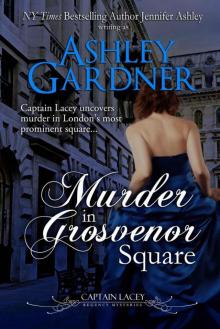 Murder in Grosvenor Square
Murder in Grosvenor Square The Untamed MacKenzie
The Untamed MacKenzie Wicked Deeds of Daniel Mackenzie
Wicked Deeds of Daniel Mackenzie Tiger Striped_Shifters Unbound
Tiger Striped_Shifters Unbound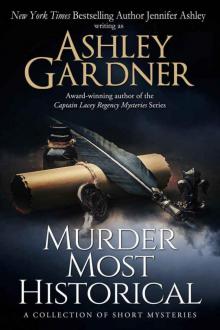 Murder Most Historical
Murder Most Historical Shifter Made
Shifter Made Mate Bond
Mate Bond Tiger Striped
Tiger Striped Bodyguard
Bodyguard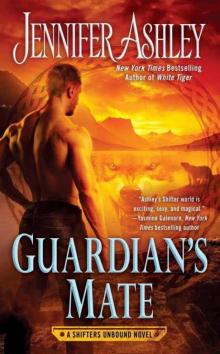 Guardian's Mate
Guardian's Mate From Jennifer Ashley, With Love
From Jennifer Ashley, With Love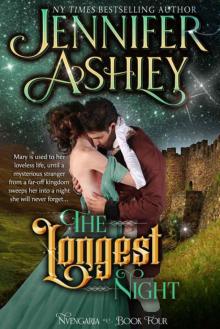 The Longest Night
The Longest Night The Stolen Mackenzie Bride
The Stolen Mackenzie Bride The Sudbury School Murders
The Sudbury School Murders The Care & Feeding of Pirates
The Care & Feeding of Pirates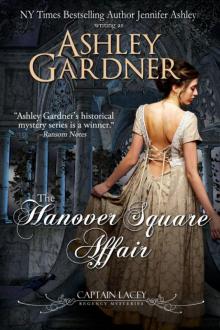 The Hanover Square Affair
The Hanover Square Affair Death Below Stairs
Death Below Stairs Wild Things
Wild Things Wild Cat
Wild Cat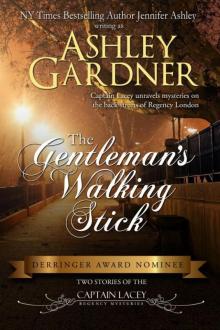 The Gentleman's Walking Stick
The Gentleman's Walking Stick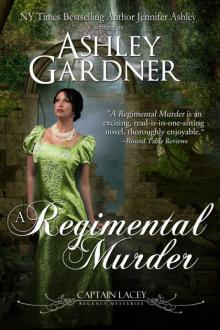 A Regimental Murder
A Regimental Murder Lone Wolf
Lone Wolf Forbidden Taste
Forbidden Taste Red Wolf
Red Wolf The Madness of Lord Ian Mackenzie
The Madness of Lord Ian Mackenzie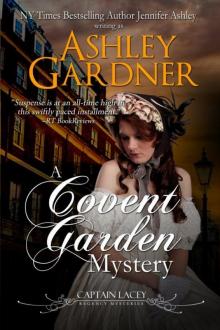 A Covent Garden Mystery
A Covent Garden Mystery The Pirate Next Door
The Pirate Next Door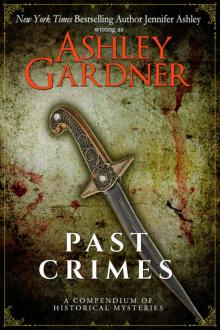 Past Crimes: A Compendium of Historical Mysteries
Past Crimes: A Compendium of Historical Mysteries Highlander Ever After
Highlander Ever After The Alexandria Affair
The Alexandria Affair A Shifter Christmas Carol
A Shifter Christmas Carol The Devilish Lord Will
The Devilish Lord Will Adam
Adam Kyle (Riding Hard Book 6)
Kyle (Riding Hard Book 6) A Body in Berkeley Square
A Body in Berkeley Square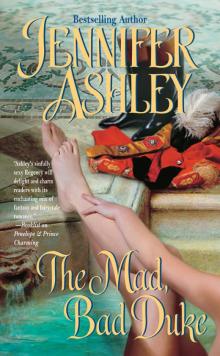 The Mad, Bad Duke
The Mad, Bad Duke Mate Claimed
Mate Claimed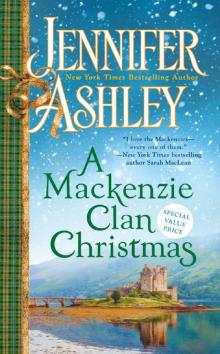 A Mackenzie Clan Christmas
A Mackenzie Clan Christmas The Seduction of Elliot McBride
The Seduction of Elliot McBride The Glass House
The Glass House Iron Master (Shifters Unbound Book 12)
Iron Master (Shifters Unbound Book 12) A Mackenzie Family Christmas: The Perfect Gift
A Mackenzie Family Christmas: The Perfect Gift Scandal Above Stairs_A Below Stairs Mystery
Scandal Above Stairs_A Below Stairs Mystery Perfect Mate
Perfect Mate Murder in the East End
Murder in the East End Snowbound in Starlight Bend
Snowbound in Starlight Bend Hard Mated
Hard Mated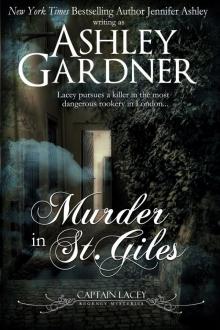 Murder in St. Giles
Murder in St. Giles Alec Mackenzie's Art of Seduction
Alec Mackenzie's Art of Seduction A MacKenzie Clan Gathering
A MacKenzie Clan Gathering Tyler
Tyler Lady Isabella's Scandalous Marriage
Lady Isabella's Scandalous Marriage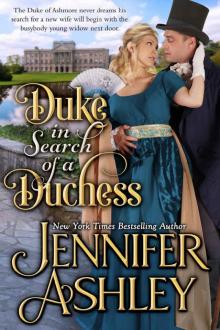 Duke in Search of a Duchess: Sweet Regency Romance
Duke in Search of a Duchess: Sweet Regency Romance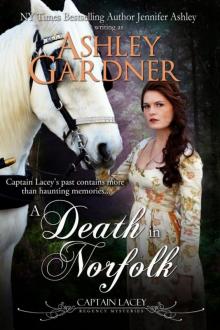 A Death in Norfolk
A Death in Norfolk Give Me One Night (McLaughlin Brothers Book 4)
Give Me One Night (McLaughlin Brothers Book 4) Iron Master
Iron Master The Many Sins of Lord Cameron
The Many Sins of Lord Cameron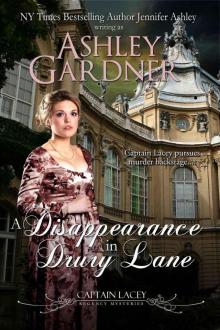 A Disappearance in Drury Lane
A Disappearance in Drury Lane Never Say Never (McLaughlin Brothers Book 3)
Never Say Never (McLaughlin Brothers Book 3) Death in Kew Gardens
Death in Kew Gardens Ross: Riding Hard, Book 5
Ross: Riding Hard, Book 5 Ray: Riding Hard
Ray: Riding Hard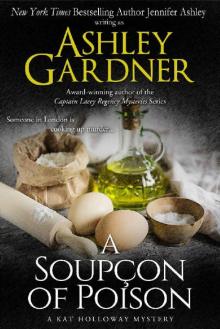 A Soupçon of Poison
A Soupçon of Poison Tiger Magic
Tiger Magic The Pirate Hunter's Lady
The Pirate Hunter's Lady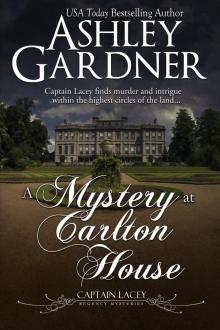 A Mystery at Carlton House
A Mystery at Carlton House The Necklace Affair
The Necklace Affair Wolf Hunt
Wolf Hunt Scandal and the Duchess
Scandal and the Duchess Kyle
Kyle Why Don't You Stay? ... Forever (McLaughlin Brothers Book 2)
Why Don't You Stay? ... Forever (McLaughlin Brothers Book 2) Bear Attraction
Bear Attraction The Gathering
The Gathering A Mackenzie Yuletide
A Mackenzie Yuletide Wild Things (Shifters Unbound #7.75)
Wild Things (Shifters Unbound #7.75) The Redeeming
The Redeeming The Seduction of Elliot McBride hp-5
The Seduction of Elliot McBride hp-5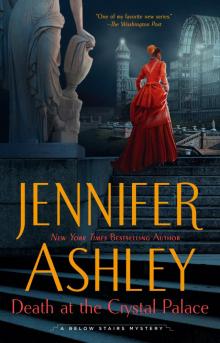 Death at the Crystal Palace
Death at the Crystal Palace Mackenzie Family Christmas: The Perfect Gift (highland pleasures)
Mackenzie Family Christmas: The Perfect Gift (highland pleasures) Forbidden Taste: A Vampire Romance (Immortals)
Forbidden Taste: A Vampire Romance (Immortals) Care and Feeding of Pirates
Care and Feeding of Pirates Shifter Made (shifters unbound)
Shifter Made (shifters unbound) Dark and Dangerous: Six-in-One Hot Paranormal Romances
Dark and Dangerous: Six-in-One Hot Paranormal Romances The Duke’s Perfect Wife hp-4
The Duke’s Perfect Wife hp-4 The Seduction of Elliot McBride (Mackenzies Series)
The Seduction of Elliot McBride (Mackenzies Series) Lady Isabella's Scandalous Marriage hp-2
Lady Isabella's Scandalous Marriage hp-2 BodyGuard (Butterscotch Martini Shots Book 2)
BodyGuard (Butterscotch Martini Shots Book 2) The Wicked Deeds of Daniel Mackenzie hp-6
The Wicked Deeds of Daniel Mackenzie hp-6 Tiger Magic su-5
Tiger Magic su-5 The Madness Of Lord Ian Mackenzie hp-1
The Madness Of Lord Ian Mackenzie hp-1 Alec Mackenzie's Art of Seduction: Mackenzies (Mackenzies Series Book 9)
Alec Mackenzie's Art of Seduction: Mackenzies (Mackenzies Series Book 9) Mackenzie Family Christmas: The Perfect Gift
Mackenzie Family Christmas: The Perfect Gift Bodyguard (Shifters Unbound #2.5)
Bodyguard (Shifters Unbound #2.5) Midnight Wolf (A Shifters Unbound Novel)
Midnight Wolf (A Shifters Unbound Novel) White Tiger (A Shifter's Unbound Novel)
White Tiger (A Shifter's Unbound Novel) Cowboys Last All Night
Cowboys Last All Night Pride Mates su-1
Pride Mates su-1 Hard Mated (shifters unbound )
Hard Mated (shifters unbound ) Bodyguard (shifters unbound )
Bodyguard (shifters unbound ) Snowbound in Starlight Bend: A Riding Hard Novella
Snowbound in Starlight Bend: A Riding Hard Novella The Untamed Mackenzie (highland pleasures)
The Untamed Mackenzie (highland pleasures) The Untamed Mackenzie (Mackenzies Series)
The Untamed Mackenzie (Mackenzies Series)![Highland Pleasures [6] The Wicked Deeds of Daniel Mackenzie Read online](http://i1.bookreadfree.com/i2/04/07/highland_pleasures_6_the_wicked_deeds_of_daniel_mackenzie_preview.jpg) Highland Pleasures [6] The Wicked Deeds of Daniel Mackenzie
Highland Pleasures [6] The Wicked Deeds of Daniel Mackenzie Lone Wolf (shifters unbound)
Lone Wolf (shifters unbound)![Shifters Unbound [5] Tiger Magic Read online](http://i1.bookreadfree.com/i2/04/11/shifters_unbound_5_tiger_magic_preview.jpg) Shifters Unbound [5] Tiger Magic
Shifters Unbound [5] Tiger Magic Tyler (Riding Hard Book 4)
Tyler (Riding Hard Book 4) Ross
Ross Bad Boys of the Night: Eight Sizzling Paranormal Romances: Paranormal Romance Boxed Set
Bad Boys of the Night: Eight Sizzling Paranormal Romances: Paranormal Romance Boxed Set From Jennifer Ashley, With Love: Three Paranormal Romances from Bestselling Series
From Jennifer Ashley, With Love: Three Paranormal Romances from Bestselling Series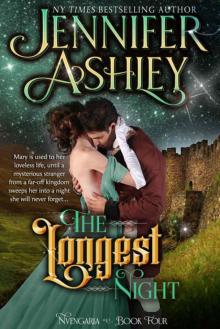 The Longest Night: Fantasy Romance (Nvengaria Book 4)
The Longest Night: Fantasy Romance (Nvengaria Book 4) The Many Sins of Lord Cameron hp-3
The Many Sins of Lord Cameron hp-3 Mate Claimed su-4
Mate Claimed su-4